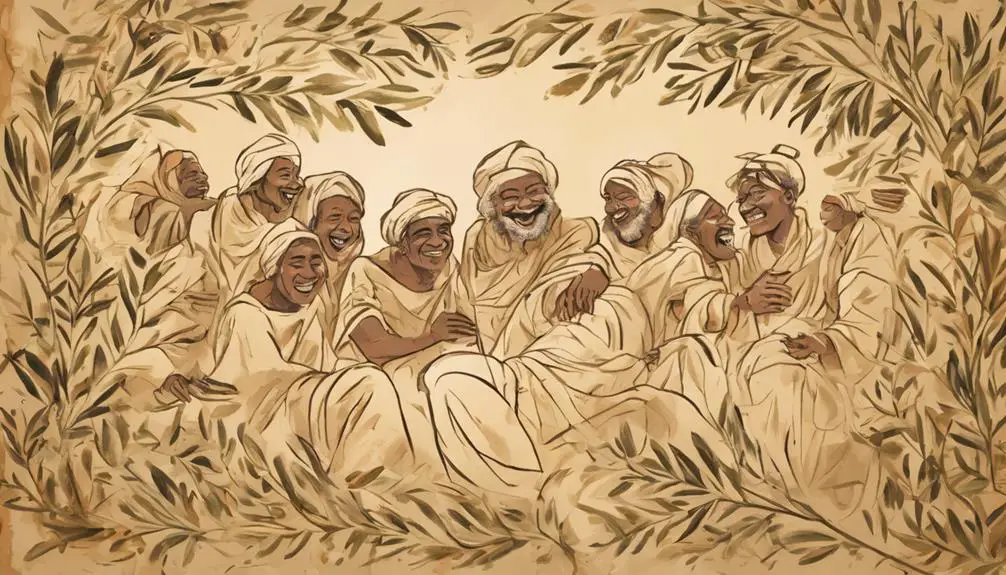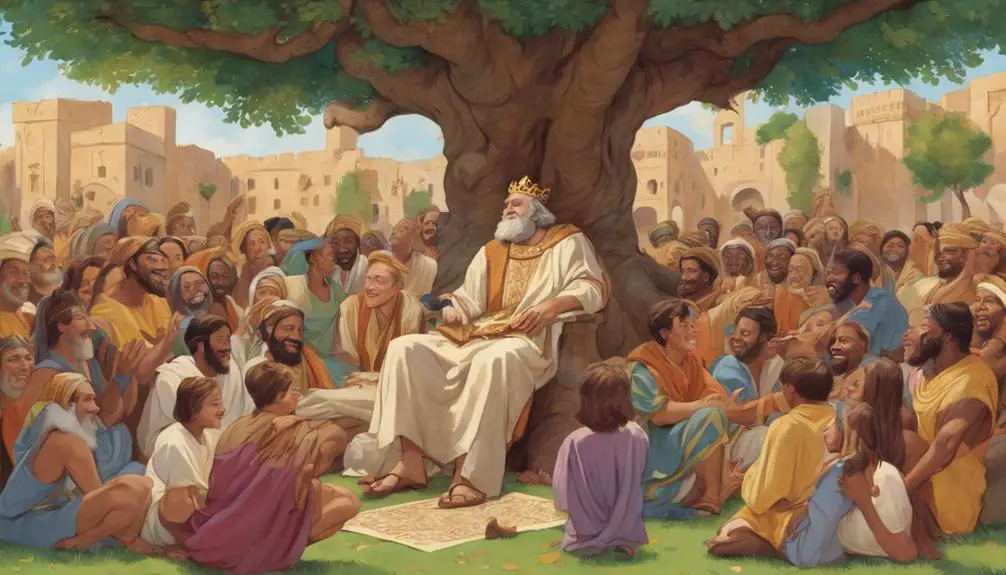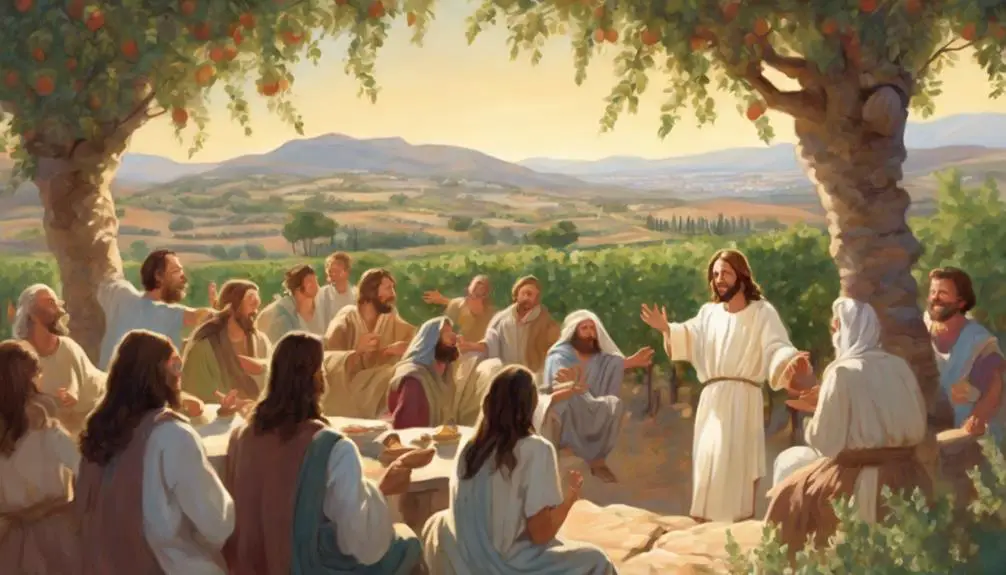Find unexpected humor in the Bible, revealing a lighter side to ancient wisdom that enriches faith and invites deeper exploration.

Spirit of Laughter in the Bible
You've heard the stories, seen the depictions, and perhaps even felt the emotions; the Bible, an ancient text, teems with tales of faith, hope, and love, but have you explored its lighter side?
The spirit of laughter weaves through its pages, from Sarah's incredulous joy to Solomon's wise cracks, revealing a facet of divine interaction that's often overlooked.
As you consider the moments of humor and irony within these sacred texts, you might find yourself surprised at the depth and relevance they add to familiar narratives.
Why does this aspect matter, and how does it enhance our understanding of the biblical message? Let's explore together, and you might just discover a refreshing perspective on age-old wisdom.
Key Takeaways
- Laughter in biblical narratives often symbolizes disbelief, transformation, and divine fulfillment.
- Biblical humor serves as a bridge between divine wisdom and human understanding, particularly through parables and wisdom literature.
- Satirical elements in the Bible critique societal norms, using humor to challenge and teach.
- Reflections on joy, time, and contentment in scriptures like Ecclesiastes encourage finding happiness in life's fleeting moments.
Sarah's Laughter: A Promise Fulfilled

Sarah's laughter, initially a manifestation of disbelief, ultimately symbolizes the fulfillment of a divine promise that defied human expectations. You'll find that her reaction isn't merely a personal response but a complex symbol that's been dissected and pondered over centuries. This laughter, borne of disbelief, transitions into a testament of faith and joy, offering a profound insight into the human condition and its interaction with the divine.
Cultural interpretations of this laughter have varied widely, reflecting the nuances of faith, skepticism, and the human capacity for wonder. In some traditions, Sarah's laughter is seen as a lapse in faith, a momentary doubt in the face of the implausible. Yet, in others, it's celebrated as the natural, human reaction to the joyously unbelievable. This duality of laughter's disbelief underscores the multifaceted nature of faith itself—rooted in the tangible world yet reaching towards the transcendent.
As you delve deeper, you'll notice how this moment in the biblical narrative challenges you to reflect on the nature of belief, the possibility of miracles, and the transformative power of divine intervention. Sarah's laughter, thus, becomes a mirror reflecting the complexities of human faith, disbelief, and joy.
Solomon's Wit: Proverbs and Joy

Exploring Solomon's wit through his proverbs unveils a profound understanding of joy and human nature. The wisdom literature attributed to him, most notably in the Book of Proverbs, offers a unique blend of wisdom's humor and joyful wisdom, which not only instructs but also entertains. This combination serves as a testament to the multifaceted character of biblical teachings, where laughter and joy are intertwined with profound insights into life and godliness.
- Wisdom's humor as a teaching tool: Solomon's proverbs often use humor to make memorable points about folly, wisdom, and the human condition.
- Joyful wisdom in daily life: The proverbs encourage finding joy in the simple, everyday moments, emphasizing a content and mindful approach to life.
- The balance between reverence and mirth: Solomon's writings demonstrate how one can fear God yet appreciate the lighter side of life.
- Laughter as a reflection of divine joy: The proverbs hint at the joy found in wisdom and right living as reflections of God's own character.
- Insight through contrast: By contrasting the wise and the foolish, Solomon's proverbs often reveal humor in human folly, offering lessons in a relatable and engaging manner.
Analyzing Solomon's proverbs, you're invited into a world where wisdom and joy meet, providing a rich tapestry of insights that celebrate the complexity of human experience through the lens of divine wisdom.
Jonah's Reluctance: Irony and Deliverance

Shifting focus from Solomon's wisdom to another realm of biblical narrative, we encounter Jonah's reluctance, a story rich with irony and the theme of divine deliverance. You might find yourself amused at the predicament of Jonah, a reluctant prophet, whose attempts to flee from God's command illuminate the humor in human attempts to escape divine will.
Jonah's journey, notably his being swallowed by a great fish, serves as a metaphor for transformation and redemption, encapsulating the essence of divine irony. His reluctance to prophesy Nineveh's fate, fearing their repentance and God's subsequent mercy, underscores a profound truth: divine compassion often subverts human expectations.
As you delve deeper, you'll discern that Jonah's story isn't merely about the avoidance of a divine mandate; it's a reflective mirror on the human condition, revealing our often-comical resistance to change and growth. The narrative of Nineveh, spared from destruction upon heeding Jonah's warning, juxtaposes the folly of resistance against the wisdom of submission to divine guidance.
In analyzing Jonah's reluctance, you're invited to reflect on the broader theme of irony in divine deliverance, where human reluctance meets divine compassion, offering both a chuckle and a profound lesson in faith.
Jesus' Parables: Humor With a Message

Have you ever considered how Jesus' parables, with their layers of humor, deliver profound spiritual truths in a manner that's both engaging and enlightening? Through the use of humorous metaphors and parabolic satire, Jesus was able to connect with His audience in a way that was both memorable and thought-provoking. The subtle humor in His parables isn't just for entertainment; it serves a deeper purpose, inviting listeners to reflect on their own lives and the world around them in a new light.
- Unexpected Twists: Many parables surprise us with their endings, challenging our expectations and prompting us to think more deeply about their messages.
- Hyperbolic Characters: Exaggerated figures, such as the overly cautious servant or the persistent widow, humorously highlight human flaws and virtues.
- Parabolic Satire: Through satirical parables, Jesus critiques societal norms and religious hypocrisy, encouraging a reevaluation of moral and spiritual priorities.
- Humorous Metaphors: Creative and amusing metaphors make the teachings more relatable, bridging the gap between divine wisdom and human understanding.
- Incongruous Scenarios: Jesus often used absurd or exaggerated scenarios to make His point, engaging the listener's imagination and prompting reflection.
This analytical approach to Jesus' parables reveals the depth of wisdom wrapped in the spirit of laughter, demonstrating how humor can be a powerful vehicle for truth.
Ecclesiastes: Reflections on Joy and Time

Delving into Ecclesiastes offers a profound meditation on the interplay between joy and the inexorable passage of time, challenging you to consider life's fleeting moments with both wisdom and levity. The text encapsulates Joy's temporality and Time's wisdom, urging you to embrace the ephemeral nature of happiness while recognizing the profound lessons woven into the fabric of time.
Ecclesiastes poignantly illustrates that joy is not a constant state but a transient experience, deeply interwoven with the seasons of life. It advocates for a balance between seeking happiness and acknowledging the inevitability of change, teaching you to find contentment in the present.
Aspect |
Ecclesiastes Insight |
Personal Reflection |
|---|---|---|
Joy's Temporality |
Fleeting and seasonal |
Embrace the moment |
Time's Wisdom |
Inevitable change |
Learn and adapt |
Life's Paradoxes |
Joy amidst adversity |
Find balance |
Eternal Perspective |
Beyond the temporal |
Seek deeper meaning |
This table emphasizes the multifaceted approach Ecclesiastes takes towards understanding joy and time, inviting you to reflect on how these concepts influence your perception of life. Through this lens, you're encouraged to appreciate the transient beauty of joy while cultivating a resilience grounded in the wisdom of time's endless cycle.
Frequently Asked Questions
How Has the Concept of Laughter Evolved in Religious Texts Outside of the Bible, and What Similarities or Differences Can Be Observed in Its Portrayal Across Various Religions?
You've noticed laughter's evolution in religious texts, revealing its deep roots in laughter philosophy and cultural rituals across various faiths. This journey shows both striking similarities and profound differences in its portrayal, reflecting each religion's unique worldview.
While some traditions embrace laughter as a sacred expression of joy and enlightenment, others view it with caution, highlighting the diverse roles laughter plays in spiritual practices and community bonding.
Are There Any Historical Accounts or Archaeological Findings That Suggest How Laughter Was Used in Religious Ceremonies or Daily Life During Biblical Times?
You're diving into whether historical accounts or archaeological findings reveal how laughter was integrated into religious ceremonies or daily life in ancient times.
Comedic artifacts and laughter rituals, though not abundantly documented, suggest that humor played a role in these contexts.
Reflecting on the evidence, it's clear that while explicit references might be rare, the essence of laughter as a communal, spiritual activity likely resonated across various cultures and epochs.
In Modern Times, How Do Various Christian Denominations Interpret and Incorporate the Theme of Laughter and Joy in Their Teachings and Worship Practices?
In modern Christianity, you'll find laughter therapy and joyous liturgy increasingly embraced across denominations. This reflects a broader understanding that spiritual wellness can intertwine with joy and humor.
Many churches now incorporate laughter into their services, viewing it as a divine gift that fosters community and healing. Reflecting on this, it's clear that the interpretation of joy within worship practices highlights its role in nurturing a deeper, more vibrant faith experience.
How Do Biblical Scholars Reconcile the Instances of Laughter in the Bible With the More Somber and Serious Themes Present in the Scriptures?
You're exploring how scholars balance laughter with solemnity in scripture. They view laughter symbolism as multifaceted, reflecting joy, mockery, or disbelief.
Cultural interpretations play a big role, as they dissect how ancient societies understood laughter's nuances. Scholars argue that laughter's inclusion alongside grave themes highlights life's complexity and the divine's embrace of human emotions.
This analytical approach shows the depth of biblical narratives, acknowledging both its light and serious dimensions.
Has the Translation of the Bible Into Different Languages Affected the Portrayal and Understanding of Laughter and Humor Found in the Original Texts?
As you delve into how translations have shaped the understanding of humor in ancient texts, it's crucial to consider linguistic nuances and cultural interpretations. These elements profoundly affect how laughter and humor are perceived.
Every language brings its own shades of meaning, potentially altering the original spirit of jest. Reflecting on this, you'll find that translation isn't just about words; it's about capturing the essence of humor across different cultural landscapes.
Conclusion
You've journeyed through biblical narratives, witnessing laughter's multifaceted role—from Sarah's incredulous joy to Solomon's wise cracks, Jonah's ironic tale, Jesus' parables laced with humor, and Ecclesiastes' contemplative joy.
Each story, rich in its context, underscores laughter not merely as an act of mirth but as a profound, theological reflection on human experience, divine promises, and the paradoxes of life.
It's evident that laughter, in its sacred textuality, serves as a spiritual lens, revealing the complexities of faith, hope, and divine interaction with humanity.



Sign up